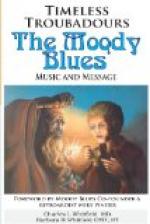Be.m enoia, s’o auzes dire,
Parliers quant es avols servire;
Et hom qui trop vol aut assire
M’enoia, e cavals que tire.
Et enoia.m, si Dieus m’aiut
Joves hom quan trop port’ escut,
Que negun colp no i a agut,
Capela et mongue barbut,
E lauzengier bee esmolut.
“These vex me greatly, if I may say so, language when it is base servility, and a man who wishes too high a place (at table) and a charger which is put to drawing carts. And, by my hope of salvation, I am vexed by a young man who bears too openly a shield which has never received a blow, by a chaplain and monk wearing beards and by the sharp beak of the slanderer.” The monk’s satire upon other troubadours is stated by himself to be a continuation of that by Peire d’Auvergne; the criticism is, as might be expected, personal. Two tensos deal with the vanities of women, especially the habit of painting the face: in one of them the dispute proceeds before God as judge, between the poet and the women: the scene of the other is laid in Paradise and the interlocutors are the Almighty and the poet, who, represents that self-adornment is a habit inherent in female nature. In neither poem is reverence a [71] prominent feature.
One of the most extraordinary figures in the whole gallery of troubadour portraits is Peire Vidal, whose career extended, roughly speaking, from 1175 to 1215. He was one of those characters who naturally become the nucleus of apocryphal stories, and how much truth there may be in some of the fantastic incidents, in which he figures as the hero, will probably never be discovered. He was undoubtedly an attractive character, for he enjoyed the favour of the most distinguished men and women of his time. He was also a poet of real power: ease and facility are characteristics of his poems as compared with the ingenious obscurity of Arnaut Daniel or Peire d’Auvergne. But there was a whimsical and fantastic strain in his character, which led him often to conjoin the functions of court-fool with those of court poet: “he was the most foolish man in the world” says his biographer. His “foolishness” also induced him to fall in love with every woman he met, and to believe that his personal attractions made him invincible.
Peire Vidal was the son of a Toulouse merchant. He began his troubadour wanderings early and at the outset of his career we find him in Catalonia, Aragon and Castile. He is then found in the service of Raimon Gaufridi Barral,[24] Viscount of Marseilles, a bluff, genial tournament [72] warrior and the husband of Azalais de Porcellet whose praises were sung by Folquet of Marseilles. It was Barral who was attracted by Peire’s peculiar talents: his wife seems to have tolerated the troubadour from deference to her husband. Peire, however, says in one of his poems that husbands feared him more than fire or sword, and believing himself irresistible interpreted Azalais’ favours as seriously meant.




